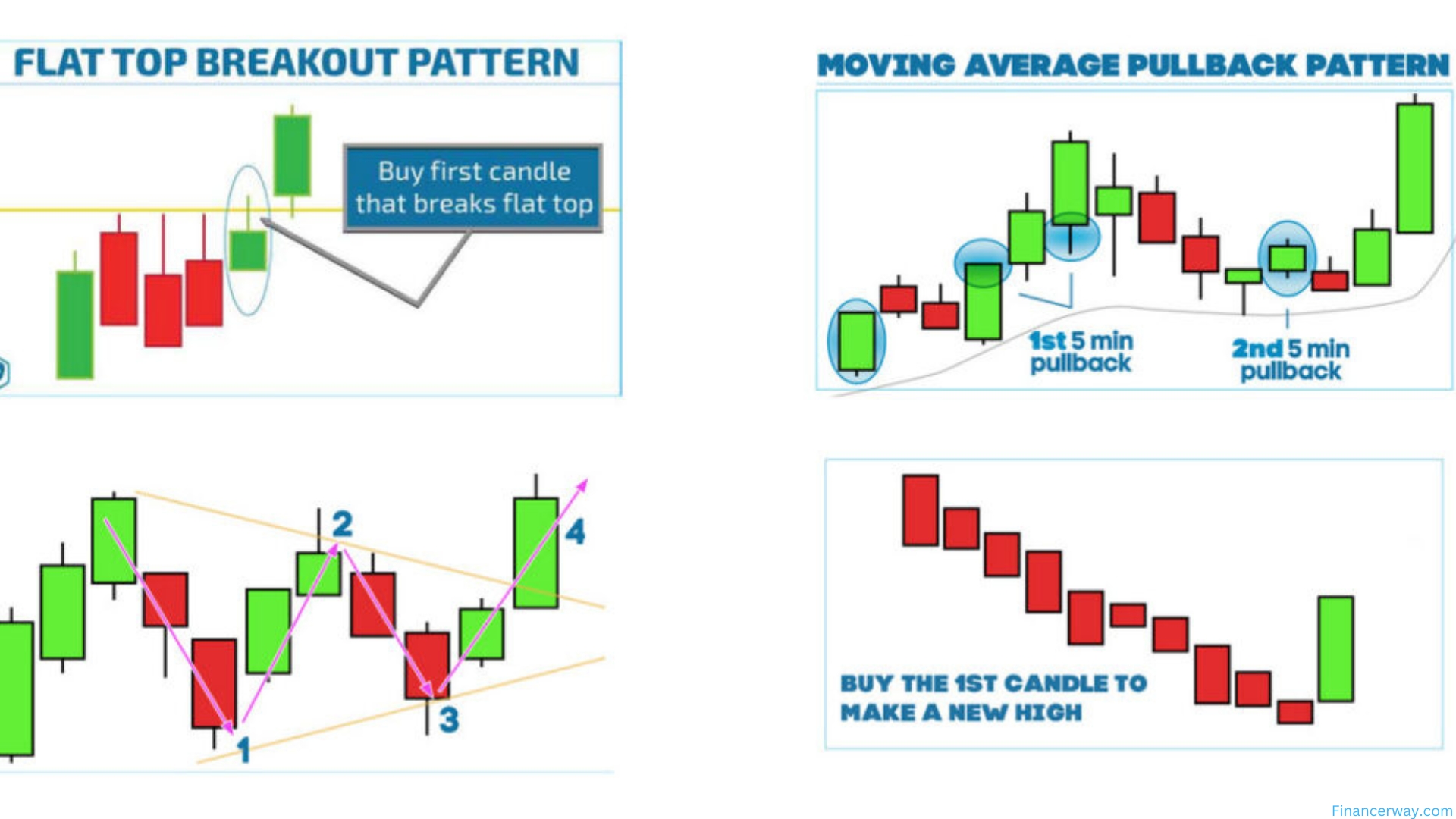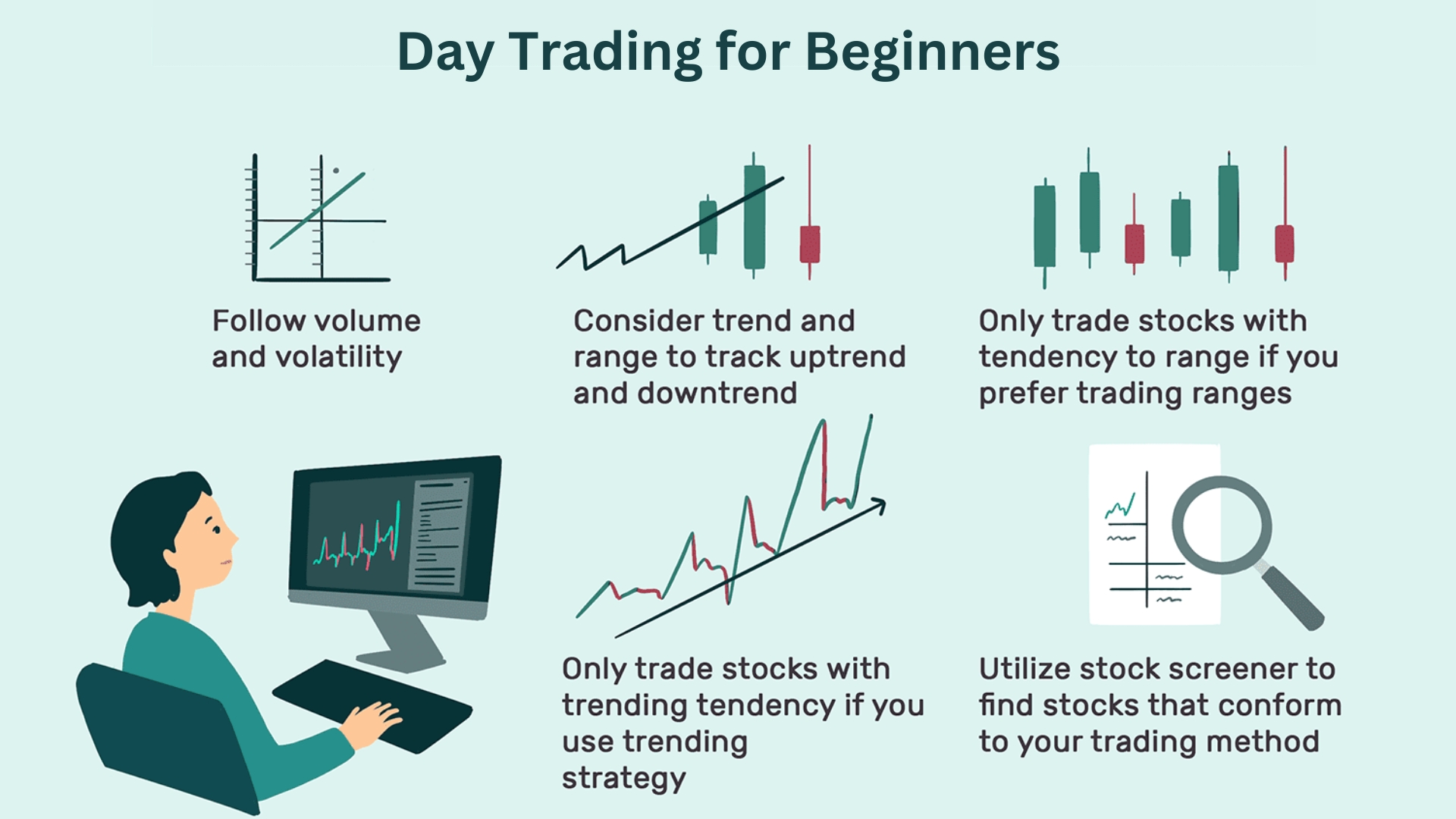Master day trading essentials: strategies, tools, and more! Start your journey to financial success now.
Day trading is a dynamic endeavor that involves buying and selling financial instruments on the same business day. As a beginner, it is important to understand the basic concepts that underlie this practice. One of the key principles is volatility – day traders capitalize on small price movements, and exploit short-term fluctuations to make profits.
Let’s start with day trading

Choose the right brokerage platform
Choosing the right brokerage platform is very important for aspiring day traders. Find a platform that offers low commissions, fast execution and robust trading tools. Do thorough research and consider factors such as customer service, platform stability and educational resources.
Understanding technical analysis
Technical analysis forms the backbone of day trading strategies. It involves analyzing price charts, indicators and patterns to predict future price movements. Familiarize yourself with common technical indicators such as moving averages, RSI (Relative Strength Index), and MACD (Average Convergence Divergence Moving).
Development of a business plan
Successful day traders stick to a well-defined trading plan. This plan should outline entry and exit criteria, risk management strategies and profit targets. Remember, discipline is the key – stick to your plan despite emotional outbursts.
Risk Management Strategies for Day Traders
| Topic | Key Points |
| What is Day Trading? | – Buying and selling financial instruments within a single trading day – Closing out positions before the market closes |
| Benefits | – Potential for high returns – Flexibility and autonomy – Opportunity to trade various markets |
| Risks | – High risk of losses – Market volatility and unexpected events – Emotional challenges |
| Getting Started | – Choose a trading platform and brokerage – Set up a trading account – Fund your account with initial capital |
| Trading Strategies | – Trend following – Range trading – Breakout trading – Scalping |
| Key Concepts | – Leverage and margin – Orders and execution – Risk management and stop-loss |
| Tips for Success | – Educate yourself and stay informed – Develop a trading plan and discipline – Manage emotions and stay focused |
| Common Mistakes | – Lack of preparation and research – Overtrading and impulsive decisions – Inadequate risk management |
Place a stop-loss order
Implementing stop-loss orders is important to reduce risk in day trading. These orders automatically trigger a sale when a security reaches a predetermined price, preventing excessive losses.
Risk-reward ratio
Maintain an optimal risk-reward ratio in your businesses. For each trade, evaluate the potential profit against the potential loss. Aim for a ratio where potential gains outweigh potential losses, even if not every trade is profitable.
Diversity
Avoid putting all your eggs in one basket by diversifying your business portfolio. Spread your investments across multiple securities to reduce the impact of negative price movements in an asset.
Advanced strategies for day trading success
Scalping
Scalping is a high-frequency trading strategy where traders aim to profit from small price movements throughout the day. This approach requires fast execution and tight spreads, so it is suitable for experienced traders. The Best Budget App for Your Financial Success
Momentum trading
Momentum trading involves capitalizing on sustained movement of an asset’s price in the same direction. Traders identify strong trends and enter positions to drive momentum, often using volume indicators to confirm price movement.
Counter trading
Contrarian traders go against the prevailing market sentiment, buying when others are selling and vice versa. This strategy requires a strong understanding of market psychology and contrarian indicators to identify potential reversals.
Finally
Finally, day trading can be an exciting and rewarding venture for startups, but it’s important to approach it with caution and realistic expectations. By properly training, developing an effective business plan, and implementing disciplined risk management, startups can increase their chances of success in this competitive world of day trading.
FAQs: Day trading for beginners
1. Is day trading good for beginners?
A. Day trading can be attractive to beginners because of the potential for quick profits, but it is important to understand the risks involved. Novices must be properly trained and prepared for the challenges of the fast-paced buying environment.
2. How much does it cost to start day trading?
A. The cost of capital to start day trading varies depending on factors such as your trading strategy and risk tolerance. While some brokerages allow you to start with as little as $500, having a larger capital base can provide more flexibility and cushion against potential losses.
3. Can I start day trading with $5000?
A. Yes, starting a day trade with $5000 is feasible and provides a more comfortable cushion compared to smaller account sizes. However, beginners should still practice careful risk management and avoid risking more than they can afford.
4. How much do day traders earn per day?
A. Day trader profits can vary greatly depending on market conditions, trading strategies and individual skills. While some traders make a lot of profit every day, others can lose. It is very good for startups that focus on developing an independent business practice rather than fixating on daily profits.
5. Can a businessman become a millionaire one day?
A. While some day traders achieve millionaire status, it is important to recognize that this level of success is rare and requires exceptional skill, discipline and luck. Startups should approach day trading with realistic expectations and focus on long-term growth rather than quick riches.
6. How difficult is everyday shopping?
A. Day trading can be challenging for beginners because of its fast pace and the need to make quick decisions. Success in day trading requires an understanding of market dynamics, technical analysis and emotional discipline. Beginners must be willing to invest time and effort in learning and practicing their skills.
7. Can I start a day trade with only $100?
A. Although it is technically possible to start a day trade with $100, it is important to recognize the limitations of such a small account size. With only $100, traders can be very limited in their trading options and struggle to pay adequate fees and potential losses.
